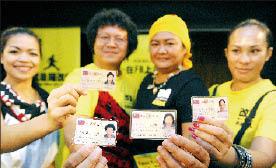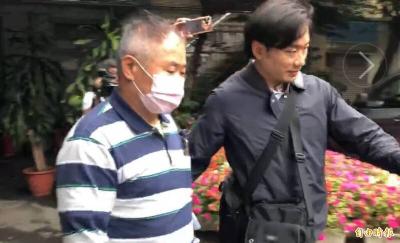Aboriginal filmmaker — and independent legislative candidate — Mayaw Biho, along with several other Aboriginal singers and youths, yesterday urged Aborigines to give up Chinese names and revert to tribal names, starting with their Facebook names.
Showing their national ID cards with transliterations of their Aboriginal names in Chinese characters, Mayaw along with fellow Amis Panai Kusui, Sumay Kacaw, Ado’ Kalitaing Pacidal, who are all singers, and Lisin Haluwey — a student at National Dong Hwa University — told a press conference in Taipei that they are Taiwanese Aborigines, and called on all Aborigines to drop their Chinese names and readopt their Aboriginal names.
Although Aborigines have been legally allowed to use their tribal names as their official names since 1995, only about 20,000 out of Taiwan’s half a million Aborigines have used tribal names on official documents.

Photo: George Tsorng, Taipei Times
Before 1995, Aborigines were required by law to use Chinese family and given names.
“Not many people changed their names, because when they want to do so, they often have to go through a complicated process at local household registration offices, and could face discrimination from non-Aborigines in the country,” Mayaw told reporters.
“Sometimes Aborigines are just too busy to go to the household registration office to change their names, which would have to be followed by a long process of name-changing on all official documents,” he said.
All traditional tribal names have important cultural significance and could serve as a bridge between the person and the history, culture, and traditions of their tribe, Mayaw said.
He also encouraged Aborigines to demand that the place names of sites in traditional Aboriginal domains in Taiwan be converted back into their traditional Aboriginal names.
“If you don’t have time, or have some difficulties in changing back to your tribal names officially, why don’t you start by changing your screen name on Facebook or other social networking sites?” Mayaw said.
“This is a way for people around you to get used to your tribal names and, when the public gets used to it, the discrimination would disappear,” he said.
Lisin said that before officially changing her name, she had been pondering the questions “who am I?” and “what kind of person do I want to become?”
“Since I was little, my Aboriginal identity was a source of discrimination against me, and I always tried to hide my identity until entering the university’s College of Indigenous Studies,” she said.
“After entering college and having increased contact with Aboriginal communities, I gradually became proud of who I am, and decided to officially give up my Chinese name and readopt my tribal name because I want people to know who I am before they even get to know me,” Lisin said.

Taiwan would benefit from more integrated military strategies and deployments if the US and its allies treat the East China Sea, the Taiwan Strait and the South China Sea as a “single theater of operations,” a Taiwanese military expert said yesterday. Shen Ming-shih (沈明室), a researcher at the Institute for National Defense and Security Research, said he made the assessment after two Japanese military experts warned of emerging threats from China based on a drill conducted this month by the Chinese People’s Liberation Army’s (PLA) Eastern Theater Command. Japan Institute for National Fundamentals researcher Maki Nakagawa said the drill differed from the

A fugitive in a suspected cosmetic surgery fraud case today returned to Taiwan from Canada, after being wanted for six years. Internet celebrity Su Chen-tuan (蘇陳端), known as Lady Nai Nai (貴婦奈奈), and her former boyfriend, plastic surgeon Paul Huang (黃博健), allegedly defrauded clients and friends of about NT$1 billion (US$30.66 million). Su was put on a wanted list in 2019 when she lived in Toronto, Canada, after failing to respond to subpoenas and arrest warrants from the Taipei District Prosecutors’ Office. Su arrived at Taiwan Taoyuan International Airport at 5am today on an EVA Air flight accompanied by a

A 79-year-old woman died today after being struck by a train at a level crossing in Taoyuan, police said. The woman, identified by her surname Wang (王), crossed the tracks even though the barriers were down in Jhongli District’s (中壢) Neili (內壢) area, the Taoyuan Branch of the Railway Police Bureau said. Surveillance footage showed that the railway barriers were lowered when Wang entered the crossing, but why she ventured onto the track remains under investigation, the police said. Police said they received a report of an incident at 6:41am involving local train No. 2133 that was heading from Keelung to Chiayi City. Investigators

The Keelung District Prosecutors’ Office today requested that a court detain three individuals, including Keelung Department of Civil Affairs Director Chang Yuan-hsiang (張淵翔), in connection with an investigation into forged signatures used in recall campaigns. Chang is suspected of accessing a household registration system to assist with recall campaigns targeting Democratic Progressive Party (DPP) city councilors Cheng Wen-ting (鄭文婷) and Jiho Chang (張之豪), prosecutors said. Prosecutors yesterday directed investigators to search six locations, including the Chinese Nationalist Party’s (KMT) Keelung office and the residences of several recall campaign leaders. The recall campaign leaders, including Chi Wen-chuan (紀文荃), Yu Cheng-i (游正義) and Hsu Shao-yeh